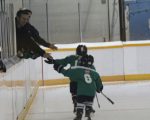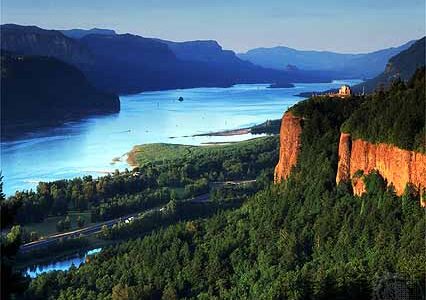Outposts
Whatever the Western media calls them, the illegal Jewish settlements on the West Bank are very far from being outposts. They are connected to Jerusalem and Tel Aviv by fast, Jews-only motorways. Their villas have swimming pools and lawns (a settler is allocated eight times more water than a Palestinian). Even the most recent and farflung of settlements are tooled-up enough to intimidate the Arabs on whose land they encroach.
It’s the Palestinian villages which feel like outposts, although some have been settled for thousands of years. Even when they’re close to major cities they are vulnerable, intermittently cut-off, and surrounded by wolves (orboars).
An example is Iraq Burin, a mountain-top village just a kilometre from Nablus but one trapped behind a checkpoint. Not only are the villagers unable to access city shops and services, they face violent harrassment from soldiers and armed men from the nearby Bracha settlement.
There’s an unarmed ‘popular’ struggle against land confiscation being waged here. It involves weekly demonstrations which are met by tear gas and sometimes bullets (in March two teenagers were killed). Similar protests are held in villages all over the West Bank, most famously in Bil’in, Nil’in and Budrus.
And in Nabi Saleh, which I tried to get to. Nabi Saleh’s agricultural water supply has been confiscated by settlers from neighbouring Halamish. On the bus Khaled Tamimi told me how for years constant gunfire had kept the villagers from tending their trees. When the gunfire stopped the orchards had been fenced off. He’s lost thirty dunams personally.
At Bir Zeit we picked up committed upper-middle class kids from the university, many mixing American English into their paragraphs. There was a happy air of expectation.
Our plan was to plant an olive tree to honour the eye of American Emily Henochowicz, shot out by direct hit from an Israeli tear gas cannister last May, to erect a sign (‘All Welcome’, in Arabic, Hebrew and English) beside the ‘No Entry’ sign guarding the stolen spring, and to attend a ‘hip hop and debke concert’ afterwards. Nice, safe stuff.
But the Israelis had other plans. A panopticon tower and an active checkpoint lay in wait at the approach to an intersection: Nabi Saleh to the left and Nablus to the right. Israeli flags fluttering. The soldiers turned us around as soon as they saw us.
We parked on the white dust at the side of the road. Our negotiators jumped out to meet the soldiers. Five minutes later they re-embarked, the bus made a half circle, and we eased through the checkpoint. We had pretended we were going to Nablus. And we did turn right, but after a kilometre we made a rapid U-turn.
“It’s funny,” I mused, “that to go somewhere you must lie.”
One of my companions responded flatly: “It isn’t lying. It’s occupation management.”
As we climbed the last hill we came to a roadblock. Boulders across the track, an armoured jeep, six soldiers. Five of the soldiers seemed to be conscripts, bewildered and uncomfortable. One, an Ashkenazi Jew, orange-haired, appeared to be in charge. His English was good and he shouted a lot.
“This place is closed.”
“Why?”
“There are problems here today. Get out!”
He wouldn’t let us park the bus and walk, not even the Nabi Saleh natives. We drove on, taking another track to the village. But the soldiers anticipated us. There they were jumping out of their jeep, orange top in the lead. The youth sitting behind me had named him Shmiegel, after the character in the Lord of the Rings.
As soon as our leader stepped outside, he was handcuffed and bustled into the jeep. More of us left the bus. A very articulate Palestinian woman spoke English. “I’m an international lawyer. Please explain why you’ve arrested this man.” I joined in, being as British as I possibly could. “Under which law have you arrested our friend?” Shmiegel ordered us back on board. The woman announced we weren’t moving until our friend was released. The stand-off lasted five minutes. In the end our leader was unarrested and we agreed to leave.
A kilometre further on, the bus stopped to let off those willing to face arrest. Those aged under 18 and foreigners who didn’t want to be deported (including me) didn’t join them. The brave ones received instructions: “Don’t touch any Israeli. Don’t respond to provocation. Keep your hands behind your back. Don’t raise your voice. If you can’t behave non-violently, please don’t come with us.”
The non-violent resistance unites Palestinians with international activists and the leftist/ activist Israeli fringe, and it does win small victories on the ground (Budrus village saved 95% of its land from encirclement by the Separation Wall). But the general trend is one step forward, two steps back.
On the way to Ramallah we passed a settlement built during the ‘freeze’. The news that evening was of a Palestinian shot dead by a settler in east Jerusalem. A few days later I drove for miles alongside the settlement of Ariel, a veritable city containing its own university and theatre, which splits the West Bank almost in two. Ariel is proof of the reality which has existed since 1967, the truth which the two-state rhetoric of the US-sponsored ‘peace process’ seeks to obscure: that a unified state controls the land between the river and the sea. The problem is that it’s an apartheid state.
Robin Yassin Kassab is a novelist and journalist. This article originally appeared on his blog, Qunfuz. Reprinted with his kind permission.
























